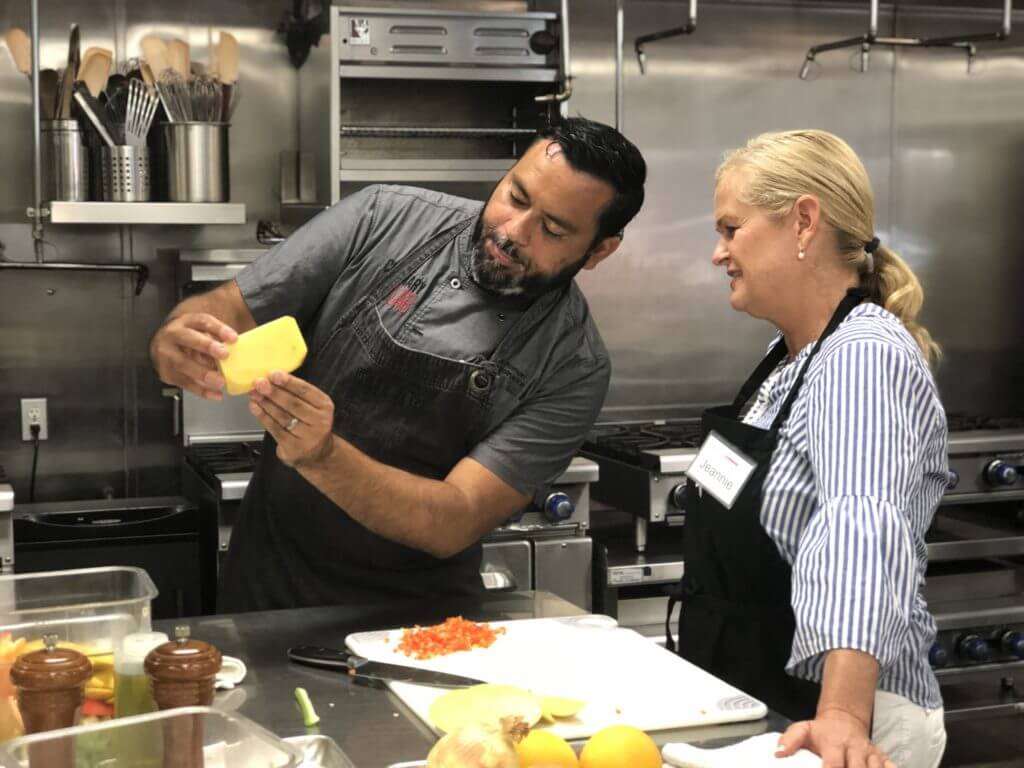How Much Do Chefs Make?

Becoming a professional chef opens the door to tons of different job opportunities. A question many people ask is, “how much money can you make as a chef?” While geographic location plays an important role when it comes to salary, additional variables like work experience and education also determine a chef’s earnings.
What Is The Difference Between A Cook And A Chef?
To fully understand the wage that a chef can make, you need to have a clear picture of the hierarchy in a professional kitchen. You may hear many people refer to themselves as cooks, but this term can be interchanged with various roles in a kitchen. It is a broad term that needs to be understood.
A cook is an entry-level to mid-level kitchen employee. They will follow specific recipes and not deviate from what the recipe calls for. There is a hierarchy amongst cooks depending on the role they play in the kitchen. This often starts at the bottom with a prep cook and works up through salad station, fry cook, onto more challenging stations like grill or fish. A cook may have the opportunity to become a chef as they gain experience and become more dedicated to the profession.
A chef is a higher-ranking kitchen employee that will be responsible for many areas. This may include managing staff and organizing workspaces throughout the kitchen. They will have a hand in planning menus, creating new dishes, and experimenting with ingredients and recipes. Those who have gained the title of a chef have worked in the culinary world for several years.
It is also important for you to understand there are various types of chefs. Each type of chef will have varying roles in the kitchen and different earning potentials. We will explain each type of chef in greater detail below.
Although it is not necessary, most individuals who are serious about moving up in the culinary industry will have some type of formal training to build foundational skills in the kitchen. Individuals who do have formal training will have a wider selection of job opportunities and may also have a greater earning potential.
Chef Salary By Title
The culinary industry is no different when it comes to earning wages. You will enter this industry as a cook because this is the entry-level title that is given to employees in the kitchen. You have to work your way up the ladder and each title that you gain can help increase your wage.
Managerial Chefs
Managerial chef positions are responsible for how a kitchen runs and ensures the overall success of the restaurant. A hierarchy has been established in the culinary world to ensure the preparation of food is done efficiently and to have a clear understanding of the chain of command in a kitchen.
- Executive Chef – An executive chef will manage all kitchen activities. These types of chefs typically spend about 20%-60% of their day cooking but are an essential part of making sure the kitchen runs smoothly. An executive chef is responsible for hiring, labor and food costs, purchasing, and the overall kitchen operation. During service they taste ingredients, model plate presentations for staff, and often work “the pass” where the food leaves the kitchen to go out to customers to ensure food presentation, timing, and quality. The national earning average for an executive chef is $60,050 per year.
- Chef De Cuisine – A Chef De Cuisine differs from an executive chef in the fact that they will focus almost exclusively on overseeing food production and have fewer administrative responsibilities. They have many of the same responsibilities, including hiring and training staff, supervising food preparation, and final plating. However, executive chefs hold more of an administrative role, and are ultimately responsible for all aspects of a foodservice operation. The chefs de cuisine will remain more actively hands-on in the cooking and preparation of meals. Just like any other chef position, it will take years of experience to gain this title. The national earning average for a chef de cuisine is $53,712.
- Head Chef – A head chef in some kitchens is the same as an executive chef. Their primary role is to oversee all kitchen activity, maintain inventory, order supplies, and they may even be responsible for training new employees. The national earning average for a head chef is $48,907 per year.
- Sous Chef – In many kitchens, a sous chef is the second-highest-ranking employee in the kitchen. They will answer to the executive or head chef. The sous chef will complete orders and help execute the restaurant’s vision. They will have direct communication with the chefs and make sure that they have everything that is needed to prepare meals. A sous chef will make more involved decisions than the executive chef. The national earning average for a sous chef is $48,606 per year.
What Can Affect A Chef’s Salary?
There are many factors to consider when it comes to the salary of a chef. The main variables include:
- Location
- Place of work
- Education
- Experience
- Size of venue
- Daily responsibilities
Location
As we saw above, location will matter when it comes to how much a chef will make. Certain cities may pay more than other cities in the same state. Busy metro areas often offer chefs a higher salary due to the high volume of people that the location may see daily.
Place of Work
Chefs are needed in lots of different culinary settings besides restaurants. Private chefs, event chefs, hotel and resort chefs, and chef instructors are examples of venues where a chef might work outside of a traditional restaurant setting. The highest paying places for chefs to work include upscale resorts, fine dining restaurants, performing arts companies, and a private chef for an individual or family.
Education
After earning a high school diploma, you can gain the skills required to work as a chef through on-the-job training as a cook or take the fast track and attend culinary school. A good culinary school can offer formal training, certifications, and apprenticeships to help boost your resume and gain work experience. Possessing a culinary certificate and participating in related opportunities like an apprenticeship is a great way to increase your chances of getting a higher salary.
Experience
As a professional chef, you’ll have the opportunity to make more money as your career progresses. Throughout their careers, chefs gain kitchen experience and become skilled in working various stations and managing a variety of responsibilities outside of cooking, such as purchasing and leading the team. Being promoted to sous chef, chef de cuisine, or executive chef leads to a higher salary.
Size Of Venue
Generally speaking, venues that serve a high volume of people, have a high price per customer or have other services that generate revenue (casinos and resorts) can offer their employees a higher wage.
Daily Responsibilities
Experience means so much in the culinary world. The more responsibilities that a chef has, the higher level of salary they will be eligible for. The responsibilities of a chef will vary on where they are working, their experience, and their education level.
Job Growth Trends
These days, many chefs are choosing to work outside of the traditional restaurant system. Some are exploring the private chef market, where the average annual salary is at least $10,000 more than that of a restaurant chef. Other high paying avenues include the corporate world, casinos, and hotels. For these chefs, the median salary is $7,000 to $11,000 higher than in restaurants.
There are always plenty of opportunities for new chefs to join the field. Culinary professionals expect an employment growth rate of 10% with more than 14,000 new jobs by 2026.
New restaurants are seeking experienced chefs for the future as they move towards a focus on high quality, upscale, and healthy foods. With high-quality menu items, chefs can expect higher competition for jobs and higher-paying positions.
A Chefs Job
A chef’s job is very different from a standard 9-to-5 office job. A job in the kitchen means long and sometimes odd hours, working with different personalities, and lots of physical requirements. However, a career as a chef is also full of creativity, flexibility, passion, and independence.
Here are some benefits to a career in culinary arts that you won’t see on your paycheck:
Creativity
For a chef, cooking is an incredible form of expression you get to share with others. You can create new recipes, experiment with ingredients, and even create your restaurant. Culinary arts is an amazing way to showcase your creativity through food.
Work With Other Talented Chefs
It’s a great way to surround yourself with creative, dedicated, and like-minded individuals. There are many incredibly talented individuals, and you’ll have the opportunity to work with them every day in the kitchen.
Work For Yourself
If you prefer a flexible schedule, then culinary arts can offer you that. There are always opportunities for talented chefs to learn new things, and work in different locations. If you’re an independent individual who values flexibility, the professional kitchen is full of potential.
Restaurants are always seeking skilled cooks and chefs, so career opportunities abound when you’re ready to learn new techniques, move to a different location, or simply find a change of pace. You could also consider a career as a personal chef for even more freedom.
Becoming a chef will take many years of experience and hard work. You will have to work long hours and be very passionate about culinary arts to thrive in this industry. Entry-level kitchen jobs start with very low pay, so you must understand that this career path has many opportunities but you will have to work hard to gain them.
If you’re passionate about cooking, not afraid of putting in the work, and interested in joining a growing field filled with talented chefs, culinary arts can be a rewarding life long career.
CulinaryLab Cooking School
CulinaryLab School offers a year-long diploma program for those who are aspiring to become a chef, learn modern cooking techniques, and pursue a career in culinary arts. Our program is dedicated to providing the most effective training through focused online curriculum, hands-on repetition practice to improve muscle memory, as well as mentorship opportunities.
We Offer:
- 16 to 1 student-teacher ratio
- 1,000-hour apprenticeship
- Hands-on training and no textbooks
- Professional-level culinary instruction
- Skill-building modules
If you aspire to become a chef and work in a professional kitchen, contact us today to learn more about our programs.










